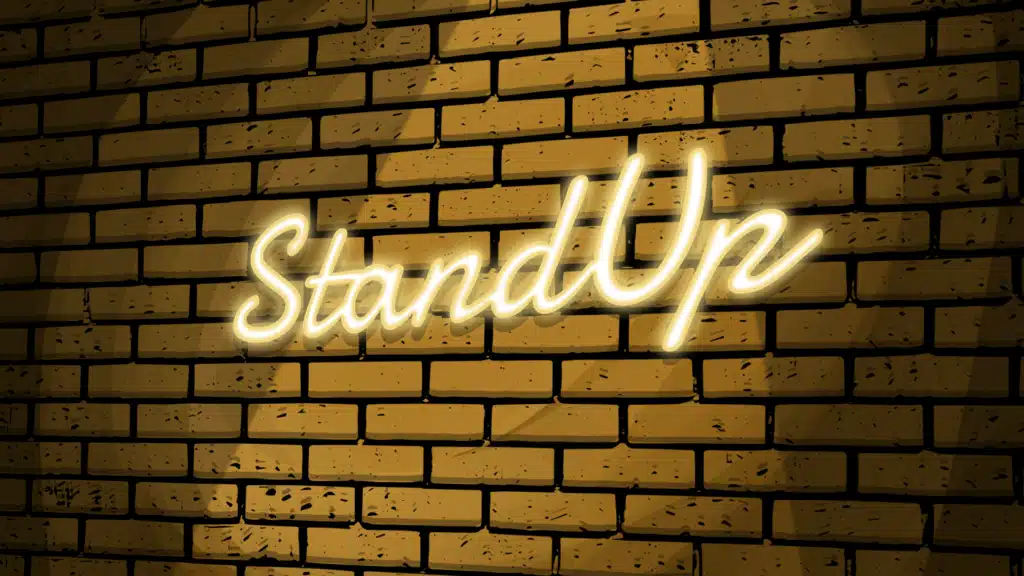By Ellis Shuman
“Tough crowd tonight.”
“You can’t win them all,” Mac said, slumping into a chair at the side of the club.
“Some of your jokes are quite funny.”
“Nah, no one’s laughing.”
Mac picked up a bottle of water and guzzled half of it before coming up for air. Upon hearing the roar of laughter greeting the next comedian performing on Open Mic night, he rubbed his eyes. “I need new material.” When he realized that he was talking to himself, he brushed off his clothes and left.
Mac had dreamed of becoming a stand-up comedian his entire life. He could make a career of it, he imagined, but his wife was not supportive of the idea. “Stand-up doesn’t pay the bills,” she complained. He would moonlight as a comedian, he vowed, until he achieved the recognition he felt he deserved.
For Mac, comedy was a calling. He was convinced that he was funny, that he had a talent, even though it had not yet been discovered by anyone. Why didn’t audiences appreciate his sense of humor?
He started each act by making fun of his name. His parents had named him Mac in recognition of their favourite foods, he declared. McDonald’s Big Mac, and Mac and Cheese. He maintained his excessive weight, he continued, with regular Big Mac takeaways and super-sized portions of Mac and Cheese. His computer? An Apple Mac, of course.
When there was no reaction from the audience, he would try another approach. “A dog walks into a bar…” The late-night clubgoers didn’t look up from their alcohol and snacks. “A priest, a rabbi, and a bishop walk into a bar…” Nothing. “Three vampires walk into a bar…”
These jokes fell on deaf ears. He attempted to improvise, but how could one interact with an audience that didn’t pay attention? His performances were heckle-free, but that was only because the crowd barely noticed him on stage. Admittedly, few of his jokes were original and his delivery was far from professional, but shouldn’t they draw a few laughs?
Later that night, a stand-up comedian walked into a bar, the one down the street from the comedy club. Mac took a seat at the counter and ordered a beer. And after that, another one.
What was he doing wrong? He was doing his best, he thought, with serious set ups leading to unexpected punchlines. His jokes were simple and short, delivered in as few words as possible, but none of this was working.
The main reason he was failing, apparently, was because his act was too clean. While other comedians joked freely on controversial topics—race, religion, politics, and sex—Mac stuck to less raunchy material. Husband-wife relationships, ridiculous situations in the workplace, the lighter side of being overweight, growing up with overbearing parents—the ordinariness of daily life was fodder for his humor. His audience didn’t appreciate any of it.
He rubbed his eyes, not because he was tired—which he was, actually—but because he was depressed. He would not become the stand-up comedian he envisioned all his life. Why waste his time trying to develop a career that wasn’t meant to be?
He lifted his eyes and saw someone sitting at the far end of the counter. A man about his own age, also rubbing his eyes. The man gripped a beer bottle, and Mac noticed it was the same brand he was drinking. Emboldened by the alcohol he had consumed, Mac slid off his stool and approached.
“Late night comfort?” Mac said, pointing at the man’s drink.
“What?” The man looked up, surprised that someone was talking to him. “Oh, you know. When things go wrong, there’s nothing like a few beers to cheer you up.”
“What went wrong?” Mac asked. “If you don’t mind my asking.”
The man took a long swig of his drink and eyed Mac warily, as if trying to determine if he posed a threat. “What do you know about things going wrong? What do you know about rejection?”
“Rejection?” Mac said. “By a woman?”
“No, nothing like that. What’s a man’s worth if everything he does, everything he creates, is rejected?”
“I don’t get it,” Mac said.
“It’s nothing that concerns you.” The man shrugged and again raised his bottle to his lips.
Mac began to move away, to head back to his safe space at the other end of the counter. The bartender stared at them for a second, but then turned back to his tasks of polishing and cleaning with a snide grin on his face.
“Actually, I do want to talk about it,” the man said, and this pulled Mac back. “My name is Gerard, by the way.”
“Mac.” He reached to shake Gerard’s hand, but his gesture was not reciprocated. “So, Gerard, what do you do for a living?”
“I’m a writer. Well, a wannabe writer. Someone who wants to be a writer, but with little success.”
“Where do you write? For a newspaper?”
“Short stories,” Gerard replied, signalling to the bartender for another beer. “Short stories no one wants to publish. Rejection. That’s all I get when I query.”
“Are they any good? Your stories?” Mac asked as he sat down on the stool next to Gerard.
“My wife thinks so, but maybe she’s just saying that.”
“That’s what you do for a living, writing?”
“I wish. I work at the hospital. X-ray technician. What I really want is to sell my stories, write full time.”
“I understand.”
“What do you understand? What do you know about rejection?”
“I get rejected a lot,” Mac said. “Every week.”
“What do you mean?”
“At the comedy club up the street. I perform at Open Mic with no success. No laughs, no applause. My jokes are rejected.”
“You’re a comedian? I would never have guessed.”
“Comedy is my passion. It’s what I’d do all the time, if I could. By day, I work in a research lab. By night, well, I’m a failure.”
“If that was meant to be a joke, it’s not funny.”
“No joke. Just the realities of life.”
“I hear you. Realities of life. That’s a good line,” Gerard said, reaching into his pocket for a pen and notepad. “Is it okay that I write it down?”
“Write what down?”
“That line. Maybe I’ll use it in one of my stories.”
“What are your stories about?”
“The realities of life, like you said. I try to come up with ideas by capturing the stories and experiences of the people around me. Real lives—that’s what inspires me. I observe what people say, what they do. I do my best to transform normal lives into works of fiction.”
“That sounds a bit like me,” Mac said. “I base my jokes on what I see around me. My wife, my parents, my boss. I observe them and transform their lives into comical anecdotes. One-liners, jokes.”
“How’s that going for you?”
“Horribly. As you said, rejection after rejection.”
“It’s strange, you a comedian and me a writer. Both of us draw our material from real life, yet neither of us has made their dreams come true.”
“I guess we have something in common,” Mac said, taking one last sip of his beer. “Well, it’s getting late and I better be going. Nice talking to you.”
“Same,” Gerard said with a goodnight nod.
Mac left the bar and walked toward his car. Strange meeting that guy, he thought. A writer, a struggling writer. A lot in common. Rejections. There was something Gerard said… ‘Both of us draw our material from real life.’ An idea popped into Mac’s mind.
‘A stand-up comedian walks into a bar, where he meets an unsuccessful writer…’
The start of a joke. A slow build-up leading to a hilarious punchline. A smile formed on Mac’s face. Hey, that’s funny, he told himself. New material for his next show, he would work it into his routine. One joke like this and he’d have everyone’s full attention.
Back in the bar, Gerard put down his empty beer bottle and contemplated ordering another. No need to get drunk, he concluded. So what if he had gotten two rejection letters earlier that day? Maybe his next submission would be accepted. Maybe a magazine editor would agree to publish his stories. He just had to find the right home for them.
Strange meeting that stand-up comedian, he thought. If the guy’s jokes fell flat in the comedy club, was that a form of rejection? Not exactly the same as having a story rejected, but still…
A joke getting rejected? Hey, that’s good! Gerard reached for his notepad, eager to jot down a line, but then a much fuller idea began forming. An idea for his next short story!
“Tough crowd tonight,” the story would begin. A performer coming off stage at a comedy club, speaking to himself. Jokes that weren’t all that funny. An indifferent audience that didn’t relate to his act. The response to the next comedian would be genuine laughter.
The story took form, and with a spurt of creativity, Gerard wrote down its outline. Suddenly, the name of the story became crystal clear.
“A Stand-Up Comedian Walks into a Bar.”
Ellis Shuman is an American-born Israeli author, travel writer, and book reviewer. His writing has appeared in The Jerusalem Post, The Times of Israel, The Oslo Times, and The Huffington Post. He is the author of The Virtual Kibbutz, Valley of Thracians, and The Burgas Affair. His short fiction has appeared in Isele Magazine, Vagabond, Literary Yard, The Write Launch, Adelaide Literary, and other literary publications. You can find him at https://ellisshuman.blogspot.com/ Twitter: @ellisshuman


